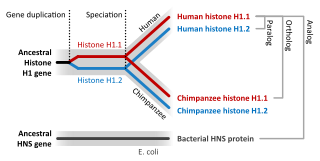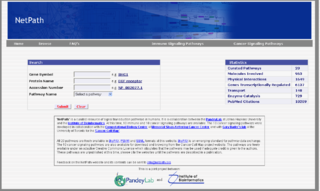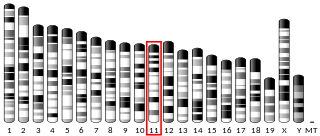Related Research Articles

Bioinformatics is an interdisciplinary field of science that develops methods and software tools for understanding biological data, especially when the data sets are large and complex. Bioinformatics uses biology, chemistry, physics, computer science, computer programming, information engineering, mathematics and statistics to analyze and interpret biological data. The subsequent process of analyzing and interpreting data is referred to as computational biology.
In the field of bioinformatics, a sequence database is a type of biological database that is composed of a large collection of computerized ("digital") nucleic acid sequences, protein sequences, or other polymer sequences stored on a computer. The UniProt database is an example of a protein sequence database. As of 2013 it contained over 40 million sequences and is growing at an exponential rate. Historically, sequences were published in paper form, but as the number of sequences grew, this storage method became unsustainable.

Sequence homology is the biological homology between DNA, RNA, or protein sequences, defined in terms of shared ancestry in the evolutionary history of life. Two segments of DNA can have shared ancestry because of three phenomena: either a speciation event (orthologs), or a duplication event (paralogs), or else a horizontal gene transfer event (xenologs).
The European Bioinformatics Institute (EMBL-EBI) is an intergovernmental organization (IGO) which, as part of the European Molecular Biology Laboratory (EMBL) family, focuses on research and services in bioinformatics. It is located on the Wellcome Genome Campus in Hinxton near Cambridge, and employs over 600 full-time equivalent (FTE) staff. Institute leaders such as Rolf Apweiler, Alex Bateman, Ewan Birney, and Guy Cochrane, an adviser on the National Genomics Data Center Scientific Advisory Board, serve as part of the international research network of the BIG Data Center at the Beijing Institute of Genomics.
InterPro is a database of protein families, protein domains and functional sites in which identifiable features found in known proteins can be applied to new protein sequences in order to functionally characterise them.
The Human Protein Reference Database (HPRD) is a protein database accessible through the Internet. It is closely associated with the premier Indian Non-Profit research organisation Institute of Bioinformatics (IOB), Bangalore, India. This database is a collaborative output of IOB and the Pandey Lab of Johns Hopkins University.

NetPath is a manually curated resource of human signal transduction pathways. It is a joint effort between Pandey Lab at the Johns Hopkins University and the Institute of Bioinformatics (IOB), Bangalore, India, and is also worked on by other parties.
Human Proteinpedia, which is closely associated with Institute of Bioinformatics (IOB), Bangalore and Johns Hopkins University, is a portal for sharing and integration of human proteomic data. It allows research laboratories to contribute and maintain protein annotations. Human Protein Reference Database (HPRD) integrates data, that is deposited in Human Proteinpedia along with the existing literature curated information at the context of an individual protein. In essence, researchers can add new data to HPRD by registering to Human Proteinpedia. The data deposited in Human Proteinpedia is freely available for download. Emphasizing the importance of proteomics data disposition to public repositories, Nature Methods recommends Human Proteinpedia in their editorial. More than 70 labs participate in this effort.

Transmembrane and ubiquitin-like domain-containing protein 2 is a protein that in humans is encoded by the TMUB2 gene.

Enkurin domain-containing protein 1 is a protein that in humans is encoded by the ENKD1 gene.
BIOBASE is an international bioinformatics company headquartered in Wolfenbüttel, Germany. The company focuses on the generation, maintenance, and licensing of databases in the field of molecular biology, and their related software platforms.

Rolf Apweiler is a director of European Bioinformatics Institute (EBI) part of the European Molecular Biology Laboratory (EMBL) with Ewan Birney.
Cancer systems biology encompasses the application of systems biology approaches to cancer research, in order to study the disease as a complex adaptive system with emerging properties at multiple biological scales. Cancer systems biology represents the application of systems biology approaches to the analysis of how the intracellular networks of normal cells are perturbed during carcinogenesis to develop effective predictive models that can assist scientists and clinicians in the validations of new therapies and drugs. Tumours are characterized by genomic and epigenetic instability that alters the functions of many different molecules and networks in a single cell as well as altering the interactions with the local environment. Cancer systems biology approaches, therefore, are based on the use of computational and mathematical methods to decipher the complexity in tumorigenesis as well as cancer heterogeneity.
The human interactome is the set of protein–protein interactions that occur in human cells. The sequencing of reference genomes, in particular the Human Genome Project, has revolutionized human genetics, molecular biology, and clinical medicine. Genome-wide association study results have led to the association of genes with most Mendelian disorders, and over 140 000 germline mutations have been associated with at least one genetic disease. However, it became apparent that inherent to these studies is an emphasis on clinical outcome rather than a comprehensive understanding of human disease; indeed to date the most significant contributions of GWAS have been restricted to the “low-hanging fruit” of direct single mutation disorders, prompting a systems biology approach to genomic analysis. The connection between genotype and phenotype remain elusive, especially in the context of multigenic complex traits and cancer. To assign functional context to genotypic changes, much of recent research efforts have been devoted to the mapping of the networks formed by interactions of cellular and genetic components in humans, as well as how these networks are altered by genetic and somatic disease.
Debasis Dash is an Indian computational biologist and chief scientist at the Institute of Genomics and Integrative Biology (IGIB). Known for his research on proteomics and Big Data and Artificial Intelligence studies, his studies have been documented by way of a number of articles and ResearchGate, an online repository of scientific articles has listed 120 of them. The Department of Biotechnology of the Government of India awarded him the National Bioscience Award for Career Development, one of the highest Indian science awards, for his contributions to biosciences, in 2014. He was appointed as the director of Institute of Life Sciences, Bhubaneswar on 18 May 2023.

Human uncharacterized protein CXorf65 is encoded by the gene CXorf65, which is located on the minus strand of chromosome X. Its transcript is 834 nucleotides long and consists of 6 exons. The translated protein is 183 amino acids in length. with a molecular weight of 21.3 kDa
Akhilesh Pandey is an Indian-American proteomicist and a Professor at Department of Laboratory Medicine and Pathology, Center for Individualized Medicine of Mayo Clinic in Rochester, Minnesota, USA. He is also the founding director and chief scientific advisor of the Institute of Bioinformatics in Bangalore, India.
Ravi Sirdeshmukh is an Indian cancer biologist and proteomicist. He is a distinguished scientist and incumbent associate director of the Institute of Bioinformatics (IOB) in Bangalore, founding president of the Proteomics Society of India and senior research advisor at the Mazumdar Shaw Center for Translational Research (MSCTR) in Bangalore. He is also an elected member of the Council of Human Proteome Organization. He is most noted for his contributions in the Human Proteome Project where he served as the Group Leader for the countries like India, Singapore, Taiwan and Thailand. Sirdeshmukh is also an invited member of the Council of Asian Oceanean HUPO (AOHUPO).
Prof. Susarla Krishna Shankar was a neuropathologist and neuroscientist who served as a Director of National Institute of Mental Health and Neuro Sciences (NIMHANS), Bengaluru, India. He also served as a Professor and Head of the Department of Neuropathology of NIMHANS from 1998 to 2012. He served in NIMHANS for more than three decades. He founded the first and only Brain Bank in India at NIMHANS to encourage neuroscience research in the nation. He, a former Research Associate in the AIIMS, New Delhi, was regarded as a pioneer in the field of biobanking. He was honored with the Pioneer in Biobanking Award by the Biobank of India Federation and is regarded as the 'Father of brain banking in India'. He also served as the President of the Neuropathology Society of India. He founded the Neuropathology Brain Museum, which is first of its kind in India, housed in NIMHANS. In addition, he was a consultant for the Bioinformatics and Proteomics Laboratory of the Institute of Bioinformatics (IOB) housed in NIMHANS. He was involved in the collaborative project of 'Human Proteome Map' of Institute of Bioinformatics (IOB), NIMHANS and Johns Hopkins University. He had been an elected fellow of various prestigious academic bodies like the College of Pathologists, the National Academy of Medical Sciences and the National Academy of Sciences.
References
- ↑ "Institute of Bioinformatics".
- ↑ Rohatgi, Ritu (22 April 2003). "Unravelling life". Times of India.
- 1 2 "Institute of Bioinformatics".
- ↑ Peri S, et al. (2003). "Development of human protein reference database as an initial platform for approaching systems biology in humans". Genome Research. 13 (10): 2363–71. doi:10.1101/gr.1680803. PMC 403728 . PMID 14525934.
- ↑ Gandhi T.K.B.; et al. (March 2006). "Analysis of the human protein interactome and comparison with yeast, worm and fly interaction datasets". Nature Genetics. 38 (3): 285–293. doi:10.1038/ng1747. PMID 16501559. S2CID 1446423.
- ↑ Kandasamy et al. Human Proteinpedia: a unified discovery resource for proteomics research. Nucleic Acids Research. Advance Access published on October 23, 2008, DOI 10.1093/nar/gkn701.
- ↑ Mathivanan et al. Human Proteinpedia enables sharing of human protein data. Nat Biotechnology. 2008 Feb;26:164-7
- ↑ Mishra et al. Human protein reference database—2006 update. Nucleic Acids Res. 2006 Jan;34(Database issue):D411-4
- ↑ Peri et al. Development of human protein reference database as an initial platform for approaching systems biology in humans. Genome Res. 2003 Oct;13:2363-71.
- ↑ Kandasamy, Kumaran; Mohan, Sujatha; Raju, Rajesh; Keerthikumar, Shivakumar; Kumar, Ghantasala S Sameer; Venugopal, Abhilash K; Telikicherla, Deepthi; Navarro, Daniel J; Mathivanan, Suresh (2010). "NetPath: a public resource of curated signal transduction pathways". Genome Biology. 11 (1): R3. doi: 10.1186/gb-2010-11-1-r3 . PMC 2847715 . PMID 20067622.
- ↑ Kandasamy, K.; Keerthikumar, S.; Raju, R.; Keshava Prasad, T. S.; Ramachandra, Y. L.; Mohan, S.; Pandey, A. (2009). "PathBuilder--open source software for annotating and developing pathway resources". Bioinformatics. 25 (21): 2860–2. doi:10.1093/bioinformatics/btp453. PMC 2781757 . PMID 19628504.
- ↑ "Institute of Bioinformatics (Funding)".
- ↑ "Nature (Volume 509 Issue 7502, 29 May 2014)".
- ↑ "NDTV coverage on the Human Proteome Map".
- ↑ "India's Research Output and Collaboration (2005-14): A Bibliometric Study (Phase II)" (PDF). Thomson Reuters. 2017.